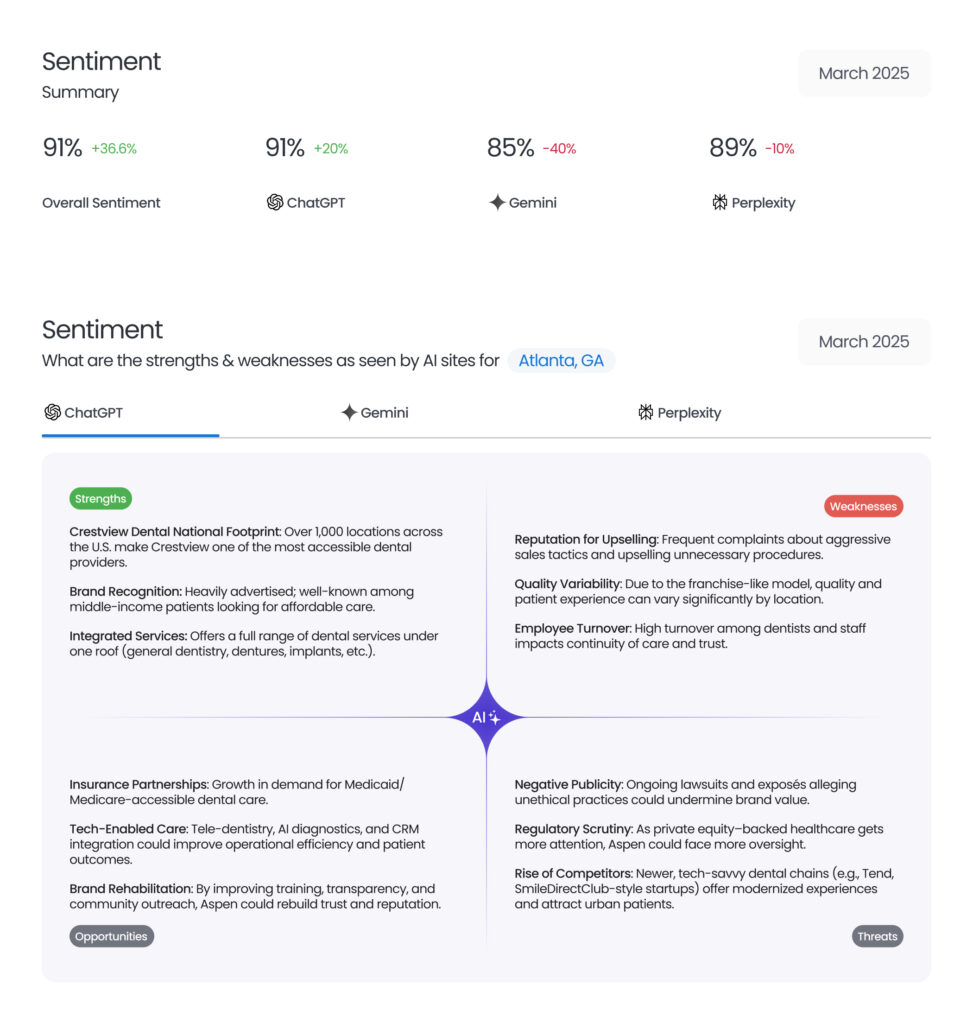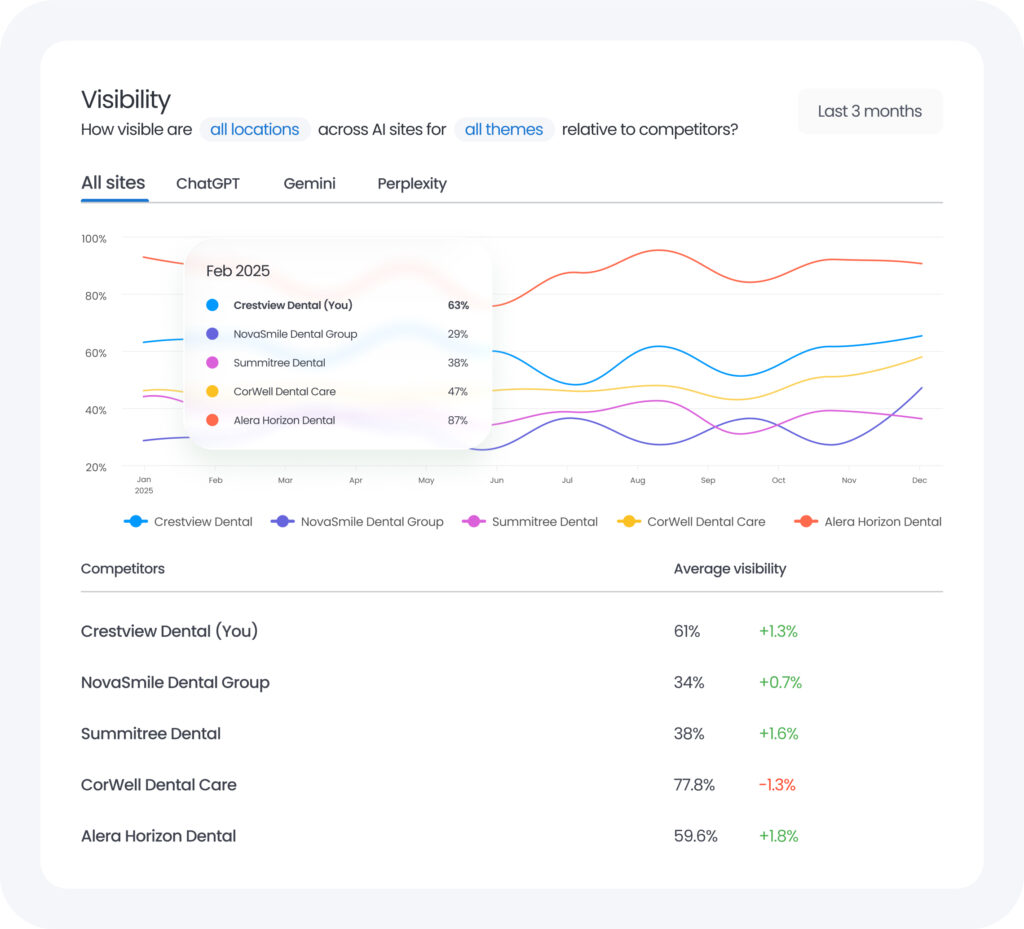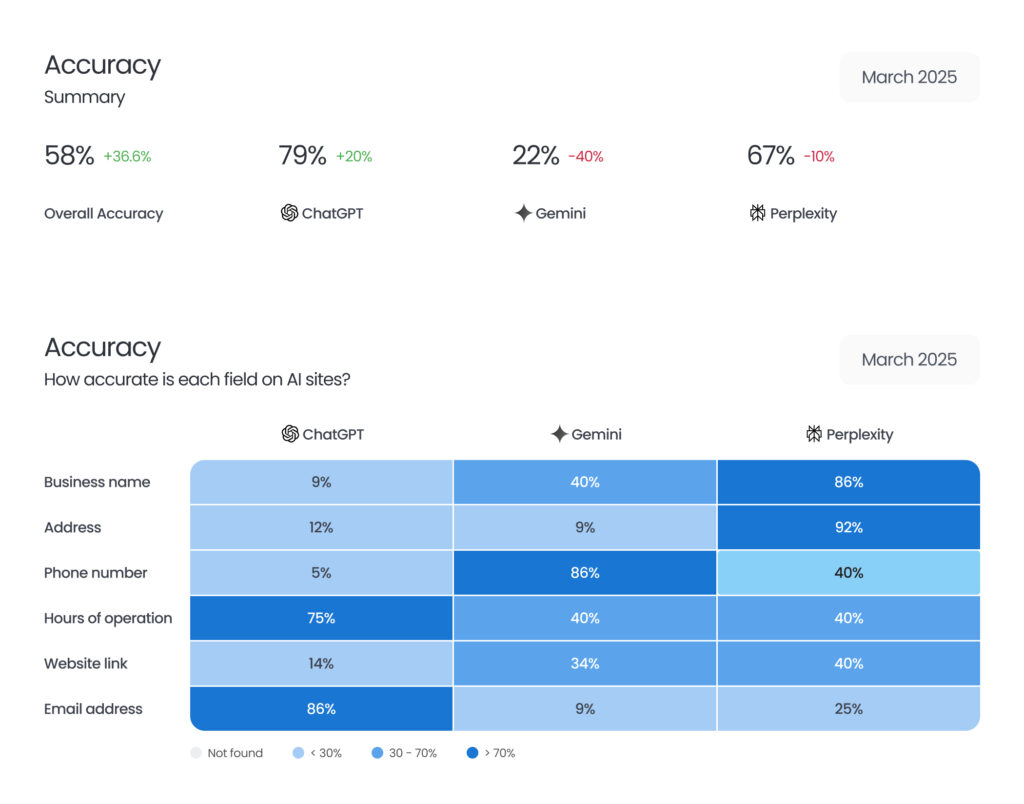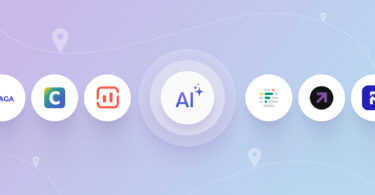Search isn’t just about ranking on Google anymore. With the rise of AI answer engines like ChatGPT, Gemini, and Perplexity, consumers are discovering brands through natural, conversational queries, instead of keyword-stuffed results pages. This shift, known as Generative Engine Optimization (GEO), is pushing brands to rethink how they get found, trusted, and chosen.
According to recent data from Search Engine Land, AI-driven discovery grew by 527% year-over-year in 2025. At the same time, some businesses have lost as much as 80% of their organic traffic because Google’s AI Overviews and other similar tools answer user queries directly, cutting out traditional clicks.
The message is clear: if brands don’t adapt, they risk disappearing at the very moment customers are making decisions.
“Brands can no longer afford to ignore GEO. The search experience has moved beyond traditional search engines. AI engines now decide what people see.”
— Adam Dorfman, AVP of Product Management and AI Search, Birdeye.
AI search is reshaping discovery, and multi-location brands face real hurdles: results feel like a black box, every AI engine works differently, and location-level visibility is tough to track or improve.
In this blog, we’ll explore the strategies to address these challenges, the behavior shift of users, and the move from SEO to GEO.
We’ll also explain how Birdeye Search AI helps multi-location brands track citations, manage sentiment, structure AI-ready content, and stay visible across major AI engines, including ChatGPT, Gemini, Perplexity, and Bing AI.
Table of contents
- What is Birdeye Search AI?
- The evolution of AI search and its impact
- From SEO to GEO: What’s changed
- Should businesses be worried about AI search?
- Birdeye Search AI: Purpose-built for GEO
- Advanced GEO strategies: Aligning with LLM behavior
- Your interactive 30-60-90-day GEO plan
- FAQs about AI search engine optimization
- Final takeaway: The new era of AI search optimization
What is Birdeye Search AI?
Search AI is Birdeye’s product that helps multi-location brands become the #1 answer on AI search.
Birdeye Search AI lets you track how your business appears across leading AI engines, including ChatGPT, Gemini, and Perplexity. You can monitor what these platforms are saying about you and take action at scale to improve how you’re cited, described, and ranked in AI answers.
To understand why a tool like Search AI is essential, you first need to look at how search itself has changed.
The evolution of AI search and its impact
Search has shifted dramatically in recent years. Instead of short, fragmented keywords, people now ask full, conversational questions and expect clear, context-aware answers.
And these questions are conversational, contextual, and often geo-targeted:
- “Best pediatric dentist near Hyde Park who accepts weekend appointments.”
- “Which restaurants in Phoenix have vegan options and 4+ star reviews on Google?”
AI engines respond with direct recommendations, not just lists of links. For businesses, this means being “answer-ready” is now more valuable than being “rank-ready.”
Younger consumers are already turning to AI platforms as their go-to for recommendations, often trusting them more than traditional search results.
At the same time, Google’s AI Overviews are shrinking the number of clicks to websites, meaning brands that rely solely on old SEO tactics are losing visibility right at the moment of customer decision-making.
Search journeys are fragmenting: people often start with AI (ChatGPT, Perplexity) to shape options, then turn to Google for the last-mile information like prices, maps, and contact details. This fragmentation makes it vital for brands to show up consistently across this entire AI ecosystem.
From SEO to GEO: What’s changed
Traditional SEO relied on keywords, backlinks, and crawlability. GEO is about creating structured, answer-first content that AI engines can confidently cite.
Three big shifts stand out:
1. Answers are limited
Unlike Google Maps or a SERP with dozens of results, AI engines often provide just two or three recommendations. If your content doesn’t include clear attributes like hours, specialties, accessibility, or unique local context, you won’t appear.
2. Citations are king
AI engines give more weight to authentic conversations on platforms like Reddit, Quora, and Instagram than to generic business directories. Outdated “directory blast” tactics no longer move the needle. What matters now is being cited in the places where real customers are talking.
3. Sentiment drives visibility
Reviews are now core signals for AI recommendations, across multiple ecosystems, not just Google reviews. Perplexity often leans on Yelp, ChatGPT looks to Tripadvisor (and similar sources), while Google taps its own review graph. A steady flow of recent, detailed, positive reviews across these networks increases the odds of being surfaced in AI answers; thin volume or negative sentiment can push a brand out of consideration.
Should businesses be worried about AI search?
The rise of AI-powered discovery has left many marketers asking the same question: “Will my brand disappear from AI search results?” The truth is, businesses don’t need fear; they need focus. Success now depends on adapting traditional SEO practices into AI search optimization strategies that align with how modern engines work.
Experts agree that preparation matters more than panic:
“Don’t panic, but do evolve. Fundamentals—helpful content, citation-building, branding—remain crucial, but they must be adapted for AI’s present, not just Google’s past.”
— Steve Wiideman, CEO and senior search strategist for Wiedemann Consulting
“Stay calm and experiment. Make AI platforms an additive layer in your strategy, not the single point of focus.”
— Carson Thetford, digital strategist, XPress Wellness
You must treat AI search engine optimization as a natural extension of your marketing playbook rather than a total reset. The more you test and adapt, the faster you’ll see your brand featured in AI search results.
“Winning brands are those excited to ride the wave, running measurable pilots in structured data, A/B tests, and ongoing learning.”
— Abhishek Iyer, marketing leader, Birdeye
In other words, the playbook isn’t dead; it simply needs a new chapter. By evolving from SEO to GEO, businesses can stay visible, credible, and recommended whenever customers turn to AI for answers.
Be found by minds and AI.
Want to see the impact of Birdeye on your business? Watch the Free Demo Now.
Birdeye Search AI: Purpose-built for GEO
Birdeye is the leading agentic marketing platform for multi-location brands. Powered by custom large language models (LLMs), its Search AI is built for AI search optimization, giving brands a complete GEO toolkit to analyze prompts, track citations, audit customer sentiment, and publish AI-ready content, all in one place.
With Birdeye Search AI, businesses can perform:
- Prompt analysis: Identify the exact questions users are asking by brand, service, and location, and the underlying themes.
- Platform visibility tracking: Benchmark where you appear across ChatGPT, Gemini, Perplexity, Bing AI, and more, compared to competitors.
- Citation identification: Pinpoint which sources AI engines cite for your industry and measure your share of citation sources.
- Accuracy audit: Check whether AI surfaces correct business details (hours, address, services, pricing) and trace sources (website, GBP, directories); flag gaps/hallucinations and issue a prioritized fix list.
- Sentiment audit: Determine how AI engines portray the brand from reviews/Q&A; provide engine- and location-level insights plus a concise SWOT to reinforce strengths and remedy weaknesses.

- AI-first content publishing: Publish schema, bullet summaries, and FAQs tailored for LLMs to quote directly.
- Search Optimization Agent (beta): An autonomous agent that audits prompts and citations, suggesting one-click optimizations.
“Birdeye’s Search AI gives multi-location brands the power to optimize visibility, sentiment, and engagement across all platforms.”
— Adam Dorfman, AVP of Product Management and AI Search, Birdeye

Remember: Don’t just list your business hours. Add hyper-specific attributes like wheelchair access, Wi-Fi, accepted insurance plans, or after-hours availability. These details increasingly determine whether AI engines recommend your business.
Advanced GEO strategies: Aligning with LLM behavior
AI search optimization requires thinking the way LLMs do. GEO is about structuring your content so AI engines can parse, cite, and confidently recommend your brand. Here’s how to align with that behavior:
1. Structure content for machines and humans
Add schema.org markup and FAQ sections across your core pages to make content easier for AI engines to parse. Begin each article with a short three-bullet executive summary, clear, citable takeaways that increase the chances of your content being surfaced in AI-generated answers.
Pro Tip: Place a 30–60 word summary at the top of every article. LLMs prefer concise, citable snippets.
2. Invest in citations and community conversations
AI engines trust brands that show up in real conversations, not just on their own sites. Encourage detailed reviews, participate in forums like Reddit or Quora, and publish content that people naturally reference. The more authentic mentions you earn, the more likely AI engines are to recommend your business.
Pro Tip: Each review or mention is a mini-citation. Collect them consistently.
3. Make content location-specific
Include nearby landmarks, neighborhoods, and “best-rated” phrases in your location pages. Google reports that “near me” searches have grown 150% faster than traditional queries, and AI engines reflect the same trend.
Pro Tip: Add a “Locals ask” box with three common, geo-specific questions and concise answers.
4. Prioritize fresh reviews
Review velocity matters. According to Birdeye’s State of Online Reviews 2025, online reviews grew 13% in 2024, which means more customers are sharing experiences and leaning on public opinion to make purchases. Keep a steady inflow of recent, detailed reviews across Google, Yelp, Tripadvisor, and industry sites to stay visible in AI answers and buyer shortlists.
Pro Tip: Ask one to three external reviewers to validate the GEO roadmap for bias and blind spots, then adjust cadences and prompts accordingly.

5. Test and adapt in sprints
Treat GEO like an ongoing experiment. Run monthly audits to see how your brand appears in AI answers, identify which attributes or content formats drive better visibility, and roll out those winning tactics across every location.
Use Birdeye Search AI to automate these audits. Its recommendations engine highlights which prompts, citations, or attributes boost visibility so you can scale improvements faster.
Your interactive 30-60-90-day GEO plan
GEO isn’t a one-off project. It’s a structured rollout. Here’s a 90-day roadmap to build momentum and scale AI search optimization across your locations.
First 30 days: Build the foundation
- Audit every location, attribute, and citation to map your current visibility.
- Add schema markup to your top 20% traffic pages.
- Rewrite five cornerstone pages with answer-first summaries.
- Convert top service pages into FAQ + summary formats.
- Launch review prompts across all locations to build citation depth.
Use Birdeye Search AI to flag missing or inconsistent location attributes early. Fixing these builds trust with AI engines.

Days 31–60: Expand your footprint
- Track inclusion and accuracy across AI engines using Birdeye Search AI dashboards.
- Publish two original data points or insights per region to attract citations.
- Seed targeted community answers on forums that naturally reference your brand.
- Add a “Compare options” block on service pages with concise, fact-driven bullets.
AI engines often pull comparison tables directly. Keep them short, factual, and neutral for maximum citation potential.
Days 61–90: Scale and sustain
- Roll out winning tactics across all remaining locations.
- Publish weekly micro-updates to keep content fresh, specific, and geo-targeted.
- Formalize a GEO governance checklist for content, PR, and CX teams so optimizations stay consistent.
Pro Tip: Use Birdeye Search AI’s trend reports to monitor which prompts or attributes shift visibility each month. This keeps your GEO strategy adaptive.
Why the time to act is now
AI search is only getting sharper. Today’s models are the least accurate they’ll ever be. Future versions will be faster, more selective, and harder to influence. Brands that start now will secure durable visibility and trust.
“Right now is the time to strike and optimize for these platforms so they recommend your business, your products, your services—so you outshine your competition and it’s harder to displace you in the future.”
— Neil Patel, Co-Founder, Neil Patel Digital
GEO readiness checklist: Prep, adapt, & dominate
Use this checklist to make sure your business is prepared for AI-powered search:
1. Run a platform and citation audit across ChatGPT, Gemini, and Perplexity.
2. Add schema and a three-bullet summary to all key pages.
3. Create Q&A sections that answer how, who, when, cost, and nearby context.
4. Standardize location attributes and keep them in sync everywhere.
5. Enhance review velocity with targeted prompts tailored to each location.
6. Publish original, local data that others can cite.
7. Track inclusion, accuracy, and sentiment monthly and iterate.

FAQs about AI search engine optimization
GEO stands for Generative Engine Optimization. It’s the foundation of AI search optimization, making your business visible, credible, and trustworthy to AI answer engines so you appear in recommendation-ready content.
No. Traditional SEO still matters. But GEO represents the evolution, think of it as an AI search engine optimization. It goes beyond rankings to focus on structured answers, trusted citations, and brand sentiment that LLMs rely on to generate AI search results.
Traditional SEO focuses on ranking web pages in Google’s search results. In contrast, AI search optimization ensures your brand is chosen as the answer in conversational platforms like ChatGPT, Gemini, Bing AI, and Perplexity. In short, SEO helps you rank, but GEO for AI search helps you get recommended.
Tools like Birdeye Search AI help you monitor your presence across ChatGPT, Gemini, Bing AI, and Perplexity. It shows where your brand is included, which prompts trigger visibility, and how your business compares in GEO.
Multi-location businesses, especially in healthcare, restaurants, retail, real estate, and services, should act fast. These categories lend themselves to considered purchases, where consumers lean on AI to compare, validate, and choose with confidence.
Brands implementing structured summaries, schema, and reviews often see gains in as little as 4–8 weeks. Early adopters of AI-driven search engine optimization tend to capture visibility more quickly, especially in competitive local markets.
Final takeaway: The new era of AI search optimization
Search has fundamentally changed. Discovery is now multi-platform, answer-driven, and AI-powered. If your brand isn’t preparing for AI search optimization, you risk being left out of the conversations where customers make decisions.
This is where GEO steps in. Unlike traditional SEO, which focuses on ranking links, GEO ensures your brand is chosen as the answer. It means structuring content for machines and humans alike, securing citations in trusted communities, and building the kind of sentiment that AI engines reward.
Birdeye Search AI equips multi-location businesses with everything they need to adapt, analyzing prompts, monitoring citations, auditing sentiment, and publishing AI-ready content at scale.
The question is no longer if you should optimize for AI search, but how soon.
Know more about Birdeye Search AI and own the top spot in AI results.

Originally published
![[Feature image] From SEO to GEO- Why brands must optimize for AI search now](https://birdeye.com/blog/wp-content/uploads/Feature-image-From-SEO-to-GEO-Why-brands-must-optimize-for-AI-search-now-1140x596.png)








